Creating Digital Stories Transcript
Speaker 1: [crowd talking inaudible 00:00:11]
Speaker 2: Morning everybody.
Speaker 1: Morning!
Speaker 1: As you guys ...
Speaker 2: Today my learners are working on revisiting their digital stories that specifically convey and communicate what they think the American creed is and what it means to them to be American.
Speaker 1: [crowd talking inaudible 00:00:33]
Speaker 2: This type of lesson is important because so many members of youth haven't had the opportunity to even think or ponder on what it does mean and with all the different sorts of identity that they carry with them, being American or part of the American society is really a huge part of it, but without giving them the opportunity to reflect on what it means, we can't really expect them to engage civically.
Speaker 3: Common qualities we all share are often found almost everywhere.
Speaker 2: Understanding that many young people might not have the vocabulary yet to be able to articulate it, I allowed them to kind of borrow words and so that's why instead of a series of readings for them to look through and find quotations that really resonated with them on what the American identity is. They were able to weave those quotes or as we call them 'hot spots' into these found poems and then create a short digital story using images that they created but then also other images that are symbols of what it means to be American. All the while getting feedback from myself and other learners.
Speaker 2: They record their narration and try to make it make sense with the images that they're presenting.
Speaker 2: Alright, so one of the questions that you guys were challenged with was the question of why is it important to understand the significance of knowing one's cultural identity. In order to address that, we have a little activity and we get to watch a video.
Speaker 1: Yay!
Speaker 2: Okay.
Speaker 4: This is us, this is us, this is ... Don't believe in narcissism when everyone projects and expects you to listen to them. Make no mistake I live in a prison that I built myself it is my religion.
Speaker 2: I'm going to give you an option on how you record your thoughts and your thinking about this. I've linked on the agenda also the lyrics.
Speaker 2: That was the first part of the lesson where we watched the video, but then they also looked at the lyrics and analyzed it as a poem and then they were able to discuss it and really try to find out what was it talking about and ultimately connect it then ... Then why is it important to understand who we are as Americans.
Speaker 5: It's saying we don't believe in narcissism and it's talking about like indifference and how you just listen to people and do what they say, kind of like equality and then it's like we never take risks, we never become ourselves. It's kind of showing us that we are turning from this idea of an America where everyone tries to innovate, tries new things, and we're turning into this, "Oh, Taylor Swift said vote for Trump, I'm going to vote for Trump." It's literally not thinking at all or just doing what someone else is telling you to do.
Speaker 2: I heard so many rich discussions and very quickly I'm going to point to each table, if you could just someone say that one nugget that really was like whoa, yeah, that was cool, okay?
Speaker 6: To build off what Silas said, it says how many likes is my life worth. I feel like they're focusing on the values that shouldn't be valued, like in America we value how many likes I get on an Instagram post or how many followers I have on Facebook and those aren't values that people should be basing their life off of.
Speaker 2: Great. Alright, I hate to wrap it up right now. We're going to move on and revisit your digital stories. Look at the feedback that you've gotten so far. We're going to use the next I'm going to say 20 minutes making revisions and Ms. [inaudible 00:04:13] and I are going to float around and give you even more feedback. Cool? And break.
Speaker 1: [crowd talking inaudible 00:04:20]
Speaker 2: After they talk about the song and hopefully have a deeper understand of that one question that was really needing some revision in their digital stories, I asked them to use some work time, look back at feedback that they had received yesterday, and maybe revise, tweak, edit, remix anything that they need to, and then also maybe incorporate what they just learned about the idea of cultural identity.
Speaker 7: Establish justice.
Speaker 2: As that happened, they were able to get more feedback and I also wanted to walk around just to see how they were feeling about the pieces that they were creating. That's why I intentionally as I was walking through, it was more getting away from the rubric and the expectations that was outlined in the activity and saying well, how do you feel about this? What did you like about it? What did you want to change about it? Does it really speak to what you wanted to say and if not, how can we get it there?
Speaker 8: I believe. I believe we do all have a dream, a dream that one day will come true. I believe we haven't changed but evolved. I believe [inaudible 00:05:23] future issues will be solved. I believe one day everyone will know what it truly means to be an American.
Speaker 2: Tell me what did you like about it?
Speaker 9: I like that I based it like on the format of Dr. Martin Luther King Jr.'s speech when he gave to the people he was trying to make everybody come together and realize that we all are so different yet we shouldn't be treated differently.
Speaker 2: Okay. What did you like about it, Desi?
Speaker 10: I just like how he based it on Martin Luther King. The same thing because it really shows you that he believes in something that I believe in and it's like so different. Like we might look differently or we might believe in different things but we're still so ... We're still the same. Yeah.
Speaker 2: Cool. What are you still wrestling with?
Speaker 9: I don't know. It was kind of like everywhere. Like it kind of changed in a way. At the beginning it was talking about America and then kind of fell into I have a dream, so I wish that could have like flowed better, I guess.
Speaker 2: Mm-hmm (affirmative). You may think about cutting some of the borrowed words.
Speaker 9: Yeah.
Speaker 2: Let your voice come out a little bit more because I think that will help with the flow.
Speaker 9: Okay.
Speaker 11: We the people of the United States have the power to achieve the impossible, strength to overcome the struggles, and courage to obtain greatness. Our beliefs are what shape us into the human beings we know today. Common qualities we all share are often found almost everywhere.
Speaker 2: Tell me what'd you like about that?
Speaker 12: I definitely like the first part where I was quoting a lot of black activists just because they are very, very important to me. This generation has just ... It's just a techy generation, you know? Including digital media in our English I class, it's very essentially to really get your message out there. It's relevant to the kids today and it makes it actually worth looking at to other kids who are our future.
Speaker 2: Originally I'd wanted learners to come back and have another round of critical friends in their groups but judging on the initial conversation with the song and then judging on how they were already openly giving each other feedback during the work time, I could tell that they really were ready to kind of reflect on what had happened that day and share out. I gave them a choice on questions that they could respond to and I wanted them to tweet it out.
Speaker 2: I would like you to choose one and respond to it. Here's an additional ... You know I like multimedia and you know that we're also drawn by visuals so maybe even take a picture or find something to support that but remember with your tweet you have to use those mentions and hashtags, okay? Awesome. Ten minutes.
Speaker 2: Okay, so let's hear what you got. Yes, Ethan.
Speaker 13: For me, I think the American creed is to celebrate our freedoms that we have been given and also show integrity for everything that we've been given. For me, it's important to not just think of freedom as being able to do stuff but to also to do good because we have the freedom to do so.
Speaker 2: Yeah, nice. Nice.
Speaker 2: What I love hearing is that you guys are really picking up on the conundrum that is being American. The idea of here we are, we want everyone to have equality and be treated equal, and sometimes what happens is we overlook or we homogenize or we try to say oh, I'm not different or this is not different, or they're not different because of this. There's a balancing act that has to happen, right? Of I know my identity, I can share it with you, that's the key, right? Being able to share your identity, being able to share those differences, and getting to a point where those differences are honored and valued so we can reach those common ground. That's what I took from you all today, so thank you.



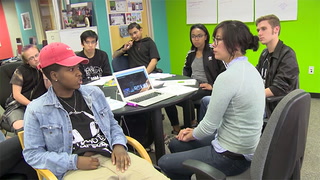
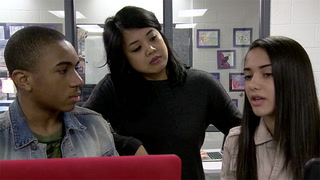
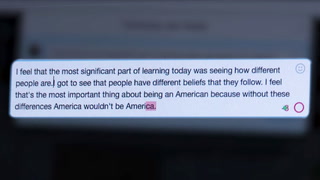
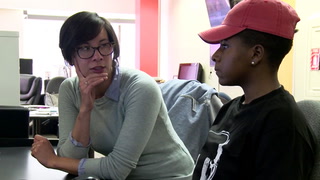
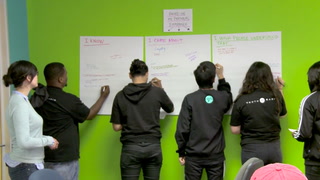










6 Comments
Erin Zost Dec 16, 2021 3:53pm
I really liked how the teacher was almost teaching three different lessons in one class. Technology, social studies, and ELA. They are learning so many different things and probably don't even realize it.
namita de Oct 31, 2020 10:55am
amazing lesson transaction and integration of technology .
Terrance Judson Mar 28, 2020 12:02pm
I loved how mult-layered it was. Thank you Ms. Bency and TeachingChannel.
I have some questions:
I noticed you give your feedback on a Google or MS spreadsheet. It looked like the feedback sheet was shared to the whole class, so that all learners could see the feedback you were giving each learner. Am I correct and why did you set it up that way?
Thank you again.
Cade Patterson Aug 23, 2019 9:37pm
The method of using music and technology with today’s generation is a great way to get them into the lesson. Based on the communication that the students were able to have with each other and their ideas based on the lyrics of a song was very unique. This was a very cool and fun teaching strategy that many can benefit from including myself.
Artis Callaham Jun 5, 2018 11:53pm